An Honest Self-Examination – Building a Kingdom of Love w/ Msgr. John Esseff Podcast
Podcast: Play in new window | Download (Duration: 28:05 — 19.4MB) | Embed
Subscribe: Apple Podcasts | Spotify | Amazon Music | Android | Pandora | iHeartRadio | JioSaavn | Podchaser | Gaana | Podcast Index | Email | TuneIn | Deezer | Anghami | RSS | More
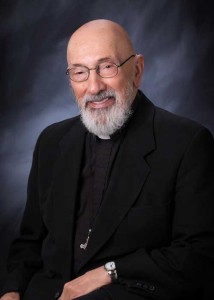
Msgr. Esseff reflects on the readings for the 5th Sunday of Lent. He guides us through an honest self-examination of conscience and the need to confess our brokenness in the Sacrament of Reconciliation.
From the NAB
Gospel. JN 8:1-11
Jesus went to the Mount of Olives.
But early in the morning he arrived again in the temple area,
and all the people started coming to him,
and he sat down and taught them.
Then the scribes and the Pharisees brought a woman
who had been caught in adultery
and made her stand in the middle.
They said to him,
“Teacher, this woman was caught
in the very act of committing adultery.
Now in the law, Moses commanded us to stone such women.
So what do you say?”
They said this to test him,
so that they could have some charge to bring against him.
Jesus bent down and began to write on the ground with his finger.
But when they continued asking him,
he straightened up and said to them,
“Let the one among you who is without sin
be the first to throw a stone at her.”
Again he bent down and wrote on the ground.
And in response, they went away one by one,
beginning with the elders.
So he was left alone with the woman before him.
Then Jesus straightened up and said to her,
“Woman, where are they?
Has no one condemned you?”
She replied, “No one, sir.”
Then Jesus said, “Neither do I condemn you.
Go, and from now on do not sin any more.”
Msgr. John A. Esseff is a Roman Catholic priest in the Diocese of Scranton. Msgr. Esseff served as a retreat director and confessor to St. Teresa of Calcutta. He continues to offer direction and retreats for the sisters of the missionaries of charity around the world. Msgr. Esseff encountered St. Padre Pio, who would become a spiritual father to him. He has lived in areas around the world, serving in the Pontifical missions, a Catholic organization established by St. Pope John Paul II to bring the Good News to the world, especially to the poor. He continues to serve as a retreat leader and director to bishops, priests and sisters and seminarians, and other religious leaders around the world.
Conference 7 – The Trinitarian Reality of Self-Giving Love /w Msgr. Esseff & Sr. Cor Immaculatum Heffernan
Conference 7 – The Trinitarian Reality of Self-Giving Love /w Msgr. Esseff & Sr. Cor Immaculatum Heffernan – Discerning Hearts Online Retreat
Retreat Directors: Monsignor John A. Esseff and Sister Cor Immaculatum Heffernan, IHM
Podcast: Play in new window | Download (Duration: 48:46 — 33.5MB) | Embed
Subscribe: Apple Podcasts | Spotify | Amazon Music | Android | Pandora | iHeartRadio | JioSaavn | Podchaser | Gaana | Podcast Index | Email | TuneIn | Deezer | Anghami | RSS | More
Conference Seven
Called to Forgiveness
# 2712 CCC
“Contemplative Prayer is the prayer of the child of God, of the forgiven
sinner who agrees to welcome the love by which he is loved and who
wants to respond to it by loving even more. But he knows that the love he
is returning is poured out by the Spirit in his heart, for everything is grace
from God.”
Old Testament: prophets – historical books – retribution, retaliation
New Testament: Jesus – forgiveness
…“So will my heavenly Father do to you, unless each of you forgives his brother from his heart”. – Matt.18: 20-35
Fruits of unforgiveness:
fracturing of persons, families, relationships, generations, nations
…led by anger and pain
…directed by negative memories
…do not act freely
…keep controlling grasp on situations and people
…pressured by lives of tension and stress
…resentment – re-sentire – to feel again
Are you called to forgive? True forgiveness:
• Is a decision
• Is unconditional
• Is showing mercy even when the act was deliberate
• Is taking the other where he/she is
• Is taking the risk of getting hurt again
• Is accepting an apology
• Is choosing to love
Having been forgiven of our sinfulness, we are called to forgive others.
 Msgr. John A. Esseff is a Roman Catholic priest in the Diocese of Scranton. He served as a retreat director and confessor to St. Teresa of Calcutta. He continues to offer direction and retreats for the sisters of the missionaries of charity. He has lived in areas around the world, serving in the Pontifical missions, a Catholic organization established by St. Pope John Paul II to bring the Good News to the world especially to the poor. He is a founding member of the Pope Leo XIII Institute. He continues to serve as a retreat leader and director to bishops, priests and sisters and seminarians, and other religious leaders.
Msgr. John A. Esseff is a Roman Catholic priest in the Diocese of Scranton. He served as a retreat director and confessor to St. Teresa of Calcutta. He continues to offer direction and retreats for the sisters of the missionaries of charity. He has lived in areas around the world, serving in the Pontifical missions, a Catholic organization established by St. Pope John Paul II to bring the Good News to the world especially to the poor. He is a founding member of the Pope Leo XIII Institute. He continues to serve as a retreat leader and director to bishops, priests and sisters and seminarians, and other religious leaders.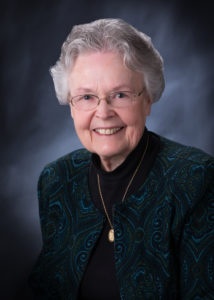
Sister Cor Immaculatum Heffernan, IHM is a member of the Sisters, Servants of the Immaculate Heart of Mary, Scranton, PA. “ She holds several degrees: a Bachelor of Arts in English/Art and a Master of Science degree in Counseling, both from Marywood; a Master of Arts degree in Sculpture from the University of Notre Dame; and a Master of Fine Arts degree in Illustration from Syracuse University. Her multi-faceted life is in itself a masterpiece: she is a teacher, a mentor, and a consultant; she is a sculptor, a harpist, a calligrapher, and a creator of mosaics; she is a counselor, a spiritual director, and above all, she is a servant of God to others”.
HM-5 “Confession” – A Handmaid of the Lord: the Life and Legacy of Adrienne von Speyr with Dr. Adrian Walker
Podcast: Play in new window | Download (Duration: 28:13 — 19.4MB) | Embed
Subscribe: Apple Podcasts | Spotify | Amazon Music | Android | Pandora | iHeartRadio | JioSaavn | Podchaser | Gaana | Podcast Index | Email | TuneIn | Deezer | Anghami | RSS | More
 Episode 5 – “Confession” – A Handmaid of the Lord: The life and legacy of Adrienne von Speyr with Dr. Adrian Walker, Ph.D.
Episode 5 – “Confession” – A Handmaid of the Lord: The life and legacy of Adrienne von Speyr with Dr. Adrian Walker, Ph.D.
With Dr. Adrian Walker, we reflect on various aspects of Adrienne’s insight into the nature of confession as described in her book of the same name.
An excerpt from “Confession” Chapter 1: Introduction – The Search for Confession
Let us assume you are my friend, and I say to you, “I can’t go on like this.” We discuss the situation together; perhaps we discover where I got off the track, and perhaps we even refer to my childhood. What we find will help me to make a new start. In every discussion of this sort, however, the individual is viewed as an isolated person, and it does not become clear that he lives in a community both of saints and sinners. Only God knows the laws both of the community of saints and of the community of sinners. In confession I am, of course, this individual sinner, but I am simultaneously a part of humanity, one of its fallen members. Thus conceptual factors are completely different in confession than in analysis. They are both personal and social; indeed, they comprise a totality that draws into focus the world as a whole, its relationship to God, and the first and last things, even if this larger context only falls into our field of vision momentarily and is experienced only indirectly. And since the situation is different, so also are the means of healing. The truth of God is involved, not the truth of the human being, nor the truth of his soul, his existence or the structure of his deeper being, but decisively the truth of God. None of the human techniques takes this divine truth seriously; at most they save it for the hour of death, and they do not help a man to become the kind of person he will need to be in that hour.
As long as aid for the human being is offered by other human beings and is mobile within the human sphere, it can operate only with human means. Everything approaching a person from external sources can be considered only as accidental and external and be supplied with a positive or negative label; the unity between interior and exterior, however, cannot be effected. The psychological session can offer me only “modes of behavior” applicable to the present, which themselves can and must change under altered conditions. Confession, on the other hand, brings a person face to face with his divine destiny and places him directly within it—within that which is final and ultimate.
As long as a person is not confessing, he feels free to speak or keep silent about whatever he wishes. What he then hates in confession is not the humbling experience of revealing himself, and not the fact that he is a sinner—he already knows that somehow—but the necessity of capitulating before and within total confession, the fact that the freedom of selection has been withdrawn and that the only choice remaining is to reveal everything or nothing. He is sick as a whole person and must be healed as such, and not eclectically. That is the first humbling experience. The second is that he is only one of many and has to accept the same conditions as do the others, even external conditions such as having to appear at the confessional at an appointed hour: a kind of marked condition, the elimination of all external differentiation—the factory owner and the watchman, the lady and her cook, all on equal footing. Precisely when one confesses that which is most intimate, one no longer has a choice or selection, is put on a level with all other sinners and is merely one penitent in the line of other sinners. The peculiarities of my particular “case”, which made it seem so interesting to me and which I would so gladly have explained to the listener, do not matter at all any more. Confession [Beichten] is above all precisely that: a confession [Bekenntnis] not only of my sins but also a confession to God and to God’s precepts and institutions, indeed to his Church with her own weakness and her myriad ambiguous, even disturbing, aspects.
The act of “speaking” with someone about my life does not oblige me further. Afterward, I can experience a certain feeling of gratitude or of awkwardness toward the person who has listened to me, but I remain the free person who can detach himself again. Confession is not an individual act in the same sense; nothing in it can be isolated. The act of confession expressly involves the whole person, his whole life, his whole world-view, his whole relationship to God.
Speyr, Adrienne von. Confession (Kindle Locations 180-209). Ignatius Press. Kindle Edition.
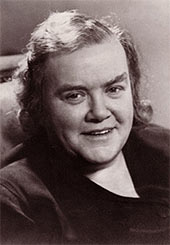 Adrienne von Speyr was a Swiss convert, mystic, wife, medical doctor and author of over 60 books on spirituality and theology. She’s inspired countless souls around the world to deepen their mission of prayer and compassion. She entered the Catholic Church under the direction of the great theologian, Hans Urs von Balthasar. In the years that would follow, they would co-found the secular institute, the Community of St. John.
Adrienne von Speyr was a Swiss convert, mystic, wife, medical doctor and author of over 60 books on spirituality and theology. She’s inspired countless souls around the world to deepen their mission of prayer and compassion. She entered the Catholic Church under the direction of the great theologian, Hans Urs von Balthasar. In the years that would follow, they would co-found the secular institute, the Community of St. John.
For more episodes in this series visit Dr. Adrian Walker’s Discerning Hearts page
Adrian Walker is an editor of the journal Communio, an International Catholic Review, who received his doctorate in philosophy at the Pontifical Gregorian University in Rome. Dr. Walker has served as a translator for the English edition of Pope Benedict XVI’s, ” Jesus of Nazareth”, as well as numerous other theological works, including those of Hans Urs von Balthasar and Adrienne von Speyr.
Our series recorded at “Casa Balthasar“, a house of discernment for men located in Rome, Italy. The Casa, was founded in 1990 by a group of friends and is directed by Rev. Jacques Servais, S.J.; Joseph Ratzinger (Pope Benedict XVI) has been closely associated with the Casa Balthasar from the very beginning as its Cardinal Protector.
Many of Adrienne von Speyr’s books can found through Ignatius Press
IP#231 Vinny Flynn – The 7 Secrets of Confession on Inside the Pages with Kris McGregor
Podcast: Play in new window | Download (Duration: 28:16 — 19.4MB) | Embed
Subscribe: Apple Podcasts | Spotify | Amazon Music | Android | Pandora | iHeartRadio | JioSaavn | Podchaser | Gaana | Podcast Index | Email | TuneIn | Deezer | Anghami | RSS | More
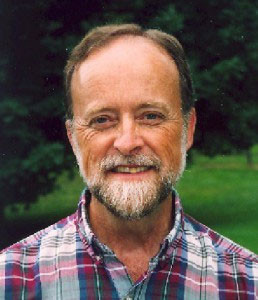
What a delight to talk once again to the incredible Vinny Flynn, this time about his book “The 7 Secrets of Confession”. Vinny has such a passion for the Catholic faith, and in particular for the Sacraments of the Church, that it’s difficult not to be inspired by his joy. This is perfect for anyone who struggles with this rich gift of grace and mercy, the sacrament “Confession”. But even more than that, it is like a “booster shot” for anyone who frequents the confessional but may be taking it for granted. A definite “must have” for every Catholic home library. This would also be a great gift for those in the RCIA or in sacramental preparation in RE classes.
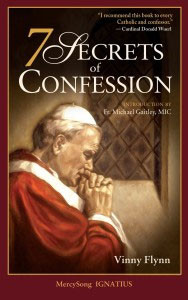 You can find the book here
You can find the book here
Vinny Flynn s 7 Secrets are like seven explosions that blow away the obstacles keeping us from the Sacrament of Mercy. If you’ve ever dragged your feet on the way to confession, gotten discouraged about confessing the same sins over and over, or wondered how your confessions could be more fruitful, then you ll love this book. It turns what many see as a tiresome obligation into a precious, longed-for encounter with the Lord.
—Fr. Michael Gaitley, MIC Author, 33 Days to Morning Glory
USCCA19 – Sacrament of Penance and Reconciliation – God is Rich in Mercy – U. S. Catholic Catechism for Adults w/ Arch. George Lucas
USCCA19 Chapter 18 – The Eucharist: Source and Summit of Christian Life
Podcast: Play in new window | Download (Duration: 28:51 — 46.2MB) | Embed
Subscribe: Apple Podcasts | Spotify | Amazon Music | Android | Pandora | iHeartRadio | JioSaavn | Podchaser | Gaana | Podcast Index | Email | TuneIn | Deezer | Anghami | RSS | More
Archbishop Lucas offers insights on the US Catholic Catechism for Adults Chapter 18:
It is called the Sacrament of Conversion because it makes sacramentally present Jesus’ call to conversion, the first step in returning to the Father from whom one has strayed by sin. It is called the Sacrament of Penance, since it consecrates the Christian sinner’s personal and ecclesial steps of conversion, penance, and satisfaction. It is called the Sacrament of Confession since the disclosure or confession of sins is an essential element of this Sacrament. In a profound sense, it is also a called “confession” —acknowledgment and praise—of the holiness of God and of his mercy toward sinful man. It is called the Sacrament of Forgiveness, since by the priest’s sacramental absolution, God grants the penitent “pardon and peace.” It is called the Sacrament of Reconciliation because it imparts to the sinner the love of God who reconciles: “Be reconciled to God” (2 Cor 5:20). He who lives by God’s merciful love is ready to respond to the Lord’s call: “Go, first be reconciled to your brother.” (CCC, nos. 1423-1424, citing Mt 5:24)
The Most Reverend George J. Lucas leads the Archdiocese of Omaha.
For other episodes in the visit our Archbishop George Lucas page
This programs is based on:
More information can be found here.
We wish to thank the USCCB for the permissions granted for use of relevant material used in this series.
Also we wish to thank Bruce McGregor for his vocal talents in this episode.
[ezcc]
BKL32 – Let NOTHING Keep You From the Love of the Father – Building a Kingdom of Love w/ Msgr. John Esseff
Podcast: Play in new window | Download (Duration: 27:14 — 24.9MB) | Embed
Subscribe: Apple Podcasts | Spotify | Amazon Music | Android | Pandora | iHeartRadio | JioSaavn | Podchaser | Gaana | Podcast Index | Email | TuneIn | Deezer | Anghami | RSS | More

Msgr. Esseff reflects on the readings for the 4th Sunday of Lent. He discusses the Sacrament of Reconciliation and how it’s key in the area of true inner healing. The healing from the damage done by our sinful choices is more important than even physical healing. He implores us all to see the value of this tremendous gift.
From the NAB
Gospel LK 15:1-3, 11-32
Tax collectors and sinners were all drawing near to listen to Jesus,
but the Pharisees and scribes began to complain, saying,
“This man welcomes sinners and eats with them.”
So to them Jesus addressed this parable:
“A man had two sons, and the younger son said to his father,
‘Father give me the share of your estate that should come to me.’
So the father divided the property between them.
After a few days, the younger son collected all his belongings
and set off to a distant country
where he squandered his inheritance on a life of dissipation.
When he had freely spent everything,
a severe famine struck that country,
and he found himself in dire need.
So he hired himself out to one of the local citizens
who sent him to his farm to tend the swine.
And he longed to eat his fill of the pods on which the swine fed,
but nobody gave him any.
Coming to his senses he thought,
‘How many of my father’s hired workers
have more than enough food to eat,
but here am I, dying from hunger.
I shall get up and go to my father and I shall say to him,
“Father, I have sinned against heaven and against you.
I no longer deserve to be called your son;
treat me as you would treat one of your hired workers.”’
So he got up and went back to his father.
While he was still a long way off,
his father caught sight of him, and was filled with compassion.
He ran to his son, embraced him and kissed him.
His son said to him,
‘Father, I have sinned against heaven and against you;
I no longer deserve to be called your son.’
But his father ordered his servants,
‘Quickly bring the finest robe and put it on him;
put a ring on his finger and sandals on his feet.
Take the fattened calf and slaughter it.
Then let us celebrate with a feast,
because this son of mine was dead, and has come to life again;
he was lost, and has been found.’
Then the celebration began.
Now the older son had been out in the field
and, on his way back, as he neared the house,
he heard the sound of music and dancing.
He called one of the servants and asked what this might mean.
The servant said to him,
‘Your brother has returned
and your father has slaughtered the fattened calf
because he has him back safe and sound.’
He became angry,
and when he refused to enter the house,
his father came out and pleaded with him.
He said to his father in reply,
‘Look, all these years I served you
and not once did I disobey your orders;
yet you never gave me even a young goat to feast on with my friends.
But when your son returns
who swallowed up your property with prostitutes,
for him you slaughter the fattened calf.’
He said to him,
‘My son, you are here with me always;
everything I have is yours.
But now we must celebrate and rejoice,
because your brother was dead and has come to life again;
he was lost and has been found.’”
Msgr. John A. Esseff is a Roman Catholic priest in the Diocese of Scranton. He was ordained on May 30th 1953, by the late Bishop William J. Hafey, D.D. at St. Peter’s Cathedral in Scranton, PA. Msgr. Esseff served a retreat director and confessor to Blessed Mother Teresa. He continues to offer direction and retreats for the sisters of the missionaries of charity around the world. Msgr. Esseff encountered St. Padre Pio, who would become a spiritual father to him. He has lived in areas around the world, serving in the Pontifical missions, a Catholic organization established by Bl. Pope John Paul II to bring the Good News to the world especially to the poor. Msgr. Esseff assisted the founders of the Institute for Priestly Formation and continues to serve as a spiritual director for the Institute. He continues to serve as a retreat leader and director to bishops, priests and sisters and seminarians and other religious leaders around the world.
To obtain a copy of Msgr. Esseff’s book by visiting here
Be sure to visit Msgr. Esseff’s website “Building a Kingdom of Love”
USCCA19 – Sacrament of Penance and Reconciliation – God is Rich in Mercy – U. S. Catholic Catechism for Adults w/ Arch. George Lucas
USCCA19 Chapter 18 – The Eucharist: Source and Summit of Christian Life
Podcast: Play in new window | Download (Duration: 28:51 — 46.2MB) | Embed
Subscribe: Apple Podcasts | Spotify | Amazon Music | Android | Pandora | iHeartRadio | JioSaavn | Podchaser | Gaana | Podcast Index | Email | TuneIn | Deezer | Anghami | RSS | More
Archbishop Lucas offers insights on the US Catholic Catechism for Adults Chapter 18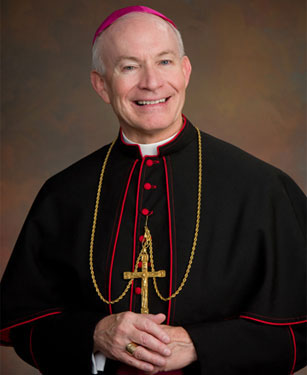
It is called the Sacrament of Conversion because it makes sacramentally present Jesus’ call to conversion, the first step in returning to the Father from whom one has strayed by sin. It is called the Sacrament of Penance, since it consecrates the Christian sinner’s personal and ecclesial steps of conversion, penance, and satisfaction. It is called the Sacrament of Confession since the disclosure or confession of sins is an essential element of this Sacrament. In a profound sense, it is also a called “confession” —acknowledgment and praise—of the holiness of God and of his mercy toward sinful man. It is called the Sacrament of Forgiveness, since by the priest’s sacramental absolution, God grants the penitent “pardon and peace.” It is called the Sacrament of Reconciliation because it imparts to the sinner the love of God who reconciles: “Be reconciled to God” (2 Cor 5:20). He who lives by God’s merciful love is ready to respond to the Lord’s call: “Go, first be reconciled to your brother.” (CCC, nos. 1423-1424, citing Mt 5:24)
The Most Reverend George J. Lucas leads the Archdiocese of Omaha.
For other episodes in the visit our Archbishop George Lucas page
This programs is based on:
More information can be found here.
We wish to thank the USCCB for the permissions granted for use of relevant material used in this series.
Also we wish to thank Bruce McGregor for his vocal talents in this episode.
[ezcc]
On Retreat with Msgr. John Esseff Day 2 Talk 3 on “On Sinfulness and the Sacrament of Reconciliation” – Discerning Hearts
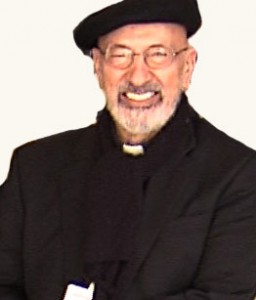 In January 2012, Msgr. Esseff conducted a weekend retreat for the Deacons and Deacon-Candidates and their wives of the Diocese of Fargo.
In January 2012, Msgr. Esseff conducted a weekend retreat for the Deacons and Deacon-Candidates and their wives of the Diocese of Fargo.
Podcast: Play in new window | Download (Duration: 55:50 — 76.7MB) | Embed
Subscribe: Apple Podcasts | Spotify | Amazon Music | Android | Pandora | iHeartRadio | JioSaavn | Podchaser | Gaana | Podcast Index | Email | TuneIn | Deezer | Anghami | RSS | More
The subject is SINFULNESS and the Sacrament of Reconciliation. The crucifixion and death of Jesus and what Jesus “sees” from the Cross. We will not grow in the Divine life given to us in Baptism if we do not become fully aware of our sinfulness in direct relation to our blessedness. The Devil is aware of Christ in us; he hates the beauty of that union. The Enemy’s purpose is to destroy that relationship. Why would we sin and endanger our union with Christ? Sin is not just breaking a commandment, it is the destruction of the Divine life in us. Sin is a 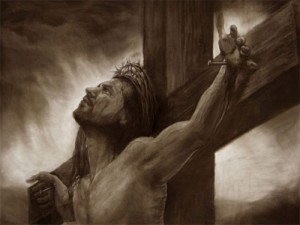 mystery; it is a darkness. Our souls are a battleground…between the forces of light and the forces of darkness, the forces of love and the forces of hatred…a complete head on crash in every soul.
mystery; it is a darkness. Our souls are a battleground…between the forces of light and the forces of darkness, the forces of love and the forces of hatred…a complete head on crash in every soul.
Msgr. Esseff then instructs on the importance of enlisting the aid of the Holy Spirit to truly prepare us for the Sacrament of Reconciliation. It’s only through the aid of the Holy Spirit can God reveal to us what truly separates us from the Father. He reveals to us our “core wound”…the tendency in our behavior that causes us to sin. Often we only pay attention to the symptoms of the wound, we need the Holy Spirit to show us the cause. The deeper we go into our sinfulness the deeper the experience of the Divine Mercy.
Be sure to visit Msgr. Esseff’s website “Building a Kingdom of Love”
On Retreat with Msgr. John Esseff Day 3 Talk 4 on “The Wounds of Unforgiveness” – Discerning Hearts
Podcast: Play in new window | Download (Duration: 49:00 — 67.3MB) | Embed
Subscribe: Apple Podcasts | Spotify | Amazon Music | Android | Pandora | iHeartRadio | JioSaavn | Podchaser | Gaana | Podcast Index | Email | TuneIn | Deezer | Anghami | RSS | More
Msgr. Esseff reflects on Matthew chap 18 v 21-35. 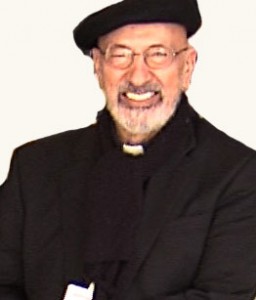 He shares the stories of a woman named Immaculee from Rwanda and young girl named Maria from Lebanon and the damage done by the hatred which is manifested in the world. We have a capacity for communion…24 hours every day, 7 days a week. How does that look in the
He shares the stories of a woman named Immaculee from Rwanda and young girl named Maria from Lebanon and the damage done by the hatred which is manifested in the world. We have a capacity for communion…24 hours every day, 7 days a week. How does that look in the  relationship found in marriage? From childhood, there are deep wounds we carry from our parents…from siblings…or from others. What can cause those wounds? The bitterness and resentment that we carry…the damage it does to us. What is the remedy? The joy of forgiveness…and forgetting. Msgr. Esseff shares a poignant story of a man named John, and how he came to forgive what many would find “unforgivable”.
relationship found in marriage? From childhood, there are deep wounds we carry from our parents…from siblings…or from others. What can cause those wounds? The bitterness and resentment that we carry…the damage it does to us. What is the remedy? The joy of forgiveness…and forgetting. Msgr. Esseff shares a poignant story of a man named John, and how he came to forgive what many would find “unforgivable”.
This is the prayer mentioned by Msgr. Esseff in the talk...click here
Be sure to visit Msgr. Esseff’s website….”Building A Kingdom of Love”
Faith Check 16 – Confession is Good Medicine
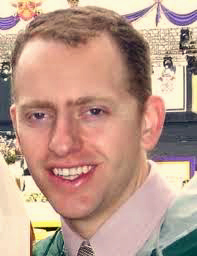
Confession is Good Medicine
Podcast: Play in new window | Download (Duration: 1:00 — 946.6KB) | Embed
Subscribe: Apple Podcasts | Spotify | Amazon Music | Android | Pandora | iHeartRadio | JioSaavn | Podchaser | Gaana | Podcast Index | Email | TuneIn | Deezer | Anghami | RSS | More
FC 16 – Confession is Good Medicine
A trip to the doctor’s office can be a scary thing, but it’s often necessary to go there to get the healing and treatment that we need.
Likewise, going to the confessional can be intimidating, but it’s often the very thing that we need to get us back on the pathway to the Lord.
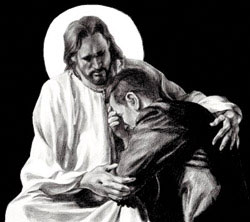 While we should also privately repent of our sins to God, Jesus instituted the sacrament of reconciliation or penance for our own good. Statistics show that Catholic populations have historically had lower rates of suicide and depression than non-Catholics, which many psychologists attribute directly to the healthy practice of vocally confessing one’s sins.
While we should also privately repent of our sins to God, Jesus instituted the sacrament of reconciliation or penance for our own good. Statistics show that Catholic populations have historically had lower rates of suicide and depression than non-Catholics, which many psychologists attribute directly to the healthy practice of vocally confessing one’s sins.
Few things can be as liberating as getting all of the junk from our lives out there on the table. The priest stands as Christ’s representative whose words of absolution, “I forgive you in the name of the Father and the Son and the Holy Spirit,” act as a sweet healing balm upon our souls. Priests are not their to scold you, but to offer healing and a fresh start.
So be not afraid, come unload your burdens before the Lord in confession today.
Faith Check 15 – Confession to Priests
Confession to Priests

Podcast: Play in new window | Download (Duration: 1:05 — 1,015.2KB) | Embed
Subscribe: Apple Podcasts | Spotify | Amazon Music | Android | Pandora | iHeartRadio | JioSaavn | Podchaser | Gaana | Podcast Index | Email | TuneIn | Deezer | Anghami | RSS | More
On this Faith Check let’s take a look at a common question: why confess your sins to a priest instead of straight to God?
First, Catholics are encouraged to privately confess our sins to God all the time and every single Mass begins with a penitential rite in which we do exactly this.
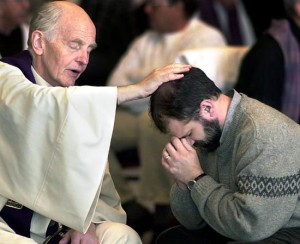 Still we should regularly go to the sacrament of confession or reconciliation. Remember that in the Old Testament a Hebrew was to publicly go to the temple and offer a sacrifice for his sin. In John 20, our Lord gives the apostles authority to forgive sins in his name, when He breathed the Holy Spirit on them and said “whose sins you forgive are forgiven them, and whose sins you retain are retained.” 1 In 2 Corinthians Paul also notes that the apostles are Christ’s ambassadors who have been given the ministry of reconciliation.2
Still we should regularly go to the sacrament of confession or reconciliation. Remember that in the Old Testament a Hebrew was to publicly go to the temple and offer a sacrifice for his sin. In John 20, our Lord gives the apostles authority to forgive sins in his name, when He breathed the Holy Spirit on them and said “whose sins you forgive are forgiven them, and whose sins you retain are retained.” 1 In 2 Corinthians Paul also notes that the apostles are Christ’s ambassadors who have been given the ministry of reconciliation.2
Early Christian records show that the early Church always understood this according to the Catholic view3:those who sinned gravely after baptism could be reconciled to the Church through confession to the priests, who do not stand as barriers to Christ, but as his ambassadors, who lovingly take us by the hand and restore us to grace after we have fallen.
1 – Jn. 20:23
2 – 5:18-20
3 – See Catholic Answers website on subject: http://www.catholic.com/library/Confession.asp
WOM#5 – The Penitential Rite – The Way of Mystery w/ Deacon James Keating – Discerning Hearts
Episode 5 -The Way of Mystery: The Eucharist and Moral Living 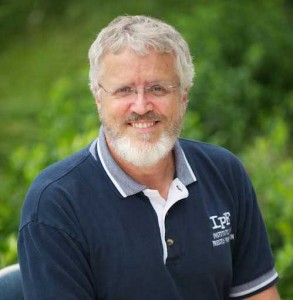
The penitential rite of the mass, while not the pivotal point, it is one of the most important points of the mass, and key in our moral conversion…it’s about the crucifixion to sin, meeting evil with love.
Podcast: Play in new window | Download (Duration: 27:57 — 25.6MB) | Embed
Subscribe: Apple Podcasts | Spotify | Amazon Music | Android | Pandora | iHeartRadio | JioSaavn | Podchaser | Gaana | Podcast Index | Email | TuneIn | Deezer | Anghami | RSS | More
For more episodes in “The Way of Mystery” Series click here
Deacon James Keating, PhD, the director of Theological Formation for the Institute for Priestly Formation, located at Creighton University, in Omaha, is making available to ”Discerning Hearts” and all who listen, his series of programs entitled “The Way of Mystery”.
 The Vatican II documents remind us that the spiritual journey is not made in a vacuum, that God has chosen to save us, not individually, but as The People of God. The Eucharist must help Christians to make their choices by discerning out of Christ’s paschal mystery. For this process to take place, however, Christians must first understand how the Eucharist puts them in touch with Christ’s passion, death, and resurrection, and what concrete implications being in touch with this mystery has for their daily lives.
The Vatican II documents remind us that the spiritual journey is not made in a vacuum, that God has chosen to save us, not individually, but as The People of God. The Eucharist must help Christians to make their choices by discerning out of Christ’s paschal mystery. For this process to take place, however, Christians must first understand how the Eucharist puts them in touch with Christ’s passion, death, and resurrection, and what concrete implications being in touch with this mystery has for their daily lives.
For more information on the “Institute of Priestly Formation” and for other material available by Deacon Keating, just click here
Don’t forget to pickup a copy of “Communion with Christ” , it is one of the best audio sets on prayer…ever!
How to prepare for the Sacrament of Penance with Archbishop Lucas episode 2 – Discerning Hearts
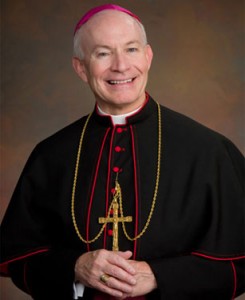 Archbishop Lucas begins a video series on the Sacrament of Penance
Archbishop Lucas begins a video series on the Sacrament of Penance
Be sure to check out more from the Archbishop on this sacrament at USCCA19 – The United States Catholic Catechism for Adults with Archbishop George Lucas – Chap. 18 Sacrament of Penance and Reconciliation – God is Rich in Mercy
The Ritual for The Sacrament of Penance with Archbishop George Lucas episode 3 – Discerning Hearts
 Archbishop Lucas begins a video series on the Sacrament of Penance
Archbishop Lucas begins a video series on the Sacrament of Penance
Be sure to check out more from the Archbishop on this sacrament at USCCA19 – The United States Catholic Catechism for Adults with Archbishop George Lucas – Chap. 18 Sacrament of Penance and Reconciliation – God is Rich in Mercy
IP#169 Shannon Dietz on Exposed on Inside the Pages
“Exposed: Inexcusable Me… Irreplaceable Him” by Shannon Dietz is a compelling book which chronicles her experiences growing up  in her devout Catholic home, dealing with realities of brokenness that results from the assaults that come from the world, from the enemy and from our own negative choices, and the healing that comes from surrendering completely to the love of Jesus Christ. Shannon shares her story of being raped, not once but twice, and the devastating effect it had on her life and self-image. She would run from God and her Catholic faith for a time, which only led her to experience a greater period of isolation and despair. Eventually she turned to Him and found the peace and strength she had been aching for in the Sacrament of Reconciliation. That moment would provide a powerful encounter of grace and mercy and would set her once again on the path home to the loving embrace of the God the Father. Her story is one that speaks to the hearts of several generation of women. A powerful story and witness that there is indeed a beautiful “light at the end of the tunnel”. Shannon is the founder of “Hopeful Hearts Ministry“…be sure to visit the website!
in her devout Catholic home, dealing with realities of brokenness that results from the assaults that come from the world, from the enemy and from our own negative choices, and the healing that comes from surrendering completely to the love of Jesus Christ. Shannon shares her story of being raped, not once but twice, and the devastating effect it had on her life and self-image. She would run from God and her Catholic faith for a time, which only led her to experience a greater period of isolation and despair. Eventually she turned to Him and found the peace and strength she had been aching for in the Sacrament of Reconciliation. That moment would provide a powerful encounter of grace and mercy and would set her once again on the path home to the loving embrace of the God the Father. Her story is one that speaks to the hearts of several generation of women. A powerful story and witness that there is indeed a beautiful “light at the end of the tunnel”. Shannon is the founder of “Hopeful Hearts Ministry“…be sure to visit the website!
Podcast: Play in new window | Download (Duration: 27:09 — 24.9MB) | Embed
Subscribe: Apple Podcasts | Spotify | Amazon Music | Android | Pandora | iHeartRadio | JioSaavn | Podchaser | Gaana | Podcast Index | Email | TuneIn | Deezer | Anghami | RSS | More
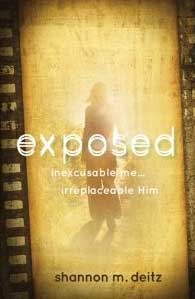 You can find the book here
You can find the book here
Patrice Fagnant–Macarthur, Sr. Editor of Catholic Lane, Author of “Letters to Mary from a Young Mother”
“It took great courage for Shannon to share her story. It is an important one for young people who are struggling with addiction or abuse and those who question whether God still cares for them.”
C.A. Webb, President of Conversations Book Club, Host of Conversations Live!
“A powerful book that helps us to live a life that is open to receive all that is meant for us.”
“Shannon’s candid sharing will prove to be a blessing to victims and those that care about them.”
Fr. Gavin Vaverek, Maria Goretti Network
Archbishop Jose Gomez -Tender Mercy of Our God
Podcast: Play in new window | Download (Duration: 24:30 — 22.4MB) | Embed
Subscribe: Apple Podcasts | Spotify | Amazon Music | Android | Pandora | iHeartRadio | JioSaavn | Podchaser | Gaana | Podcast Index | Email | TuneIn | Deezer | Anghami | RSS | More
Fr. Mitch Pacwa Go In Peace-reconciliation – Discerning Hearts
Podcast: Play in new window | Download (Duration: 32:34 — 29.8MB) | Embed
Subscribe: Apple Podcasts | Spotify | Amazon Music | Android | Pandora | iHeartRadio | JioSaavn | Podchaser | Gaana | Podcast Index | Email | TuneIn | Deezer | Anghami | RSS | More
IP#117 Fr. Scott Hurd – Forgiveness on Inside the Pages
“Forgiveness: A Catholic Approach” is exceptional! Fr. Scott Hurd has penned the book that should be in 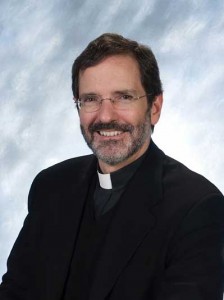 every Catholic home. To forgive, without exception, is the hallmark of the Christian life and one of the hardest things to do. Every single chapter in “Forgivness” is a gem. Whether it’s is the challenge of “not becoming a doormat”, dealing with our anger over hurts, or reconciling the fact that life isn’t necessarily fair, Fr. Hurd offers timely wisdom from the heart of the Church to the experiences of everyday life in order for us to follow the way of Jesus Christ…and to forgive. I love this book!
every Catholic home. To forgive, without exception, is the hallmark of the Christian life and one of the hardest things to do. Every single chapter in “Forgivness” is a gem. Whether it’s is the challenge of “not becoming a doormat”, dealing with our anger over hurts, or reconciling the fact that life isn’t necessarily fair, Fr. Hurd offers timely wisdom from the heart of the Church to the experiences of everyday life in order for us to follow the way of Jesus Christ…and to forgive. I love this book!
Podcast: Play in new window | Download (Duration: 28:58 — 66.3MB) | Embed
Subscribe: Apple Podcasts | Spotify | Amazon Music | Android | Pandora | iHeartRadio | JioSaavn | Podchaser | Gaana | Podcast Index | Email | TuneIn | Deezer | Anghami | RSS | More
“All of us know that there is more to forgiveness than simply saying “I’m sorry.” In the section entitled, “Hallmarks of Forgiveness,” Father Hurd deftly outlines seven such marks of forgiveness that reflect the teaching and example of Our Lord. In Jesus, we learn how to forgive others as God has forgiven us. Forgiveness is a decision, a process, and a gift.
“Equally challenging today is the question of how to forgive. In Forgiveness: A Catholic Approach we find an entire section on this topic. With priestly wisdom, Father Hurd examines a wide variety of experiences of forgiveness and reconciliation. With examples from Scripture, Church tradition, literature, and his own ministry, he offers a useful ten-step process to aid people ready to make the decision to forgive.”
–Cardinal Donald Wuerl, from the Introduction
You can find “Forgiveness” here
Visit Pauline.org for more information
The Sacrament of Reconciliation – the gift of the healing that flows from the confessional – Discerning Hearts
Podcast: Play in new window | Download (Duration: 22:43 — 20.8MB) | Embed
Subscribe: Apple Podcasts | Spotify | Amazon Music | Android | Pandora | iHeartRadio | JioSaavn | Podchaser | Gaana | Podcast Index | Email | TuneIn | Deezer | Anghami | RSS | More

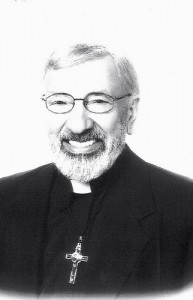 Msgr. Esseff discusses the Sacrament of Reconciliation. What is a “core wound”? What prevents us from being Christ in the world today? Who do we encounter in the confessional? What is the role of the Cross in the confessional? What does Jesus see from the Cross? What is the role of the Holy Spirit in revealing the “core wound”?
Msgr. Esseff discusses the Sacrament of Reconciliation. What is a “core wound”? What prevents us from being Christ in the world today? Who do we encounter in the confessional? What is the role of the Cross in the confessional? What does Jesus see from the Cross? What is the role of the Holy Spirit in revealing the “core wound”?
visit Msgr. Esseff’s website “Building A Kingdom of Love”
An Examination of Conscience…this just about covers it all…(is that possible?)
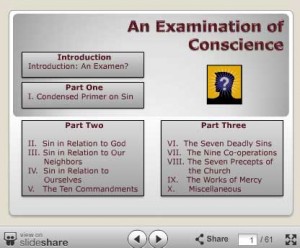 Baltimore Catechism to the Catholic Catechism, from the Ten Commandments to the 7 Deadly Sins, through in Archbishop Fulton Sheen and you have the help that can get through Lent and beyond…but first and foremost, start with PRAYER…come back now and then to check out different sections . Now let’s dive into the great well of grace and mercy found in the Sacrament of Reconciliation!
Baltimore Catechism to the Catholic Catechism, from the Ten Commandments to the 7 Deadly Sins, through in Archbishop Fulton Sheen and you have the help that can get through Lent and beyond…but first and foremost, start with PRAYER…come back now and then to check out different sections . Now let’s dive into the great well of grace and mercy found in the Sacrament of Reconciliation!IP#65 Sr. Briege McKenna – The Power of the Sacraments part 2 on Inside the Pages
Part 2 of 3…Sr. Briege McKenna O.S.C. is a tremendous blessing for all of us in the Church! “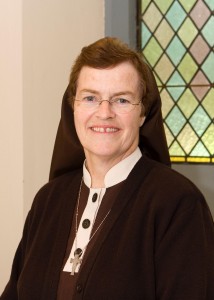 The Power of the Sacraments” is a beautiful work which helps us all to appreciate the gift of grace that flows through the sacraments. There is such a hunger in the hearts of God’s children today for healing and peace. Sr. Briege, in her beautiful maternal nurturing way, helps us to see that the answer is right in front of us reaching out to us right now…he is Jesus Christ. “Miracles Do Happen” is her beautiful book recounting her miraculous healing and her call to mission to the world. It also expresses her great love and concern for the priesthood. Her insights are tremendous…her love for Christ and her bride, the Church, is a glorious witness and light for today’s world. She is truly one of the most inspiring persons I have ever encountered!
The Power of the Sacraments” is a beautiful work which helps us all to appreciate the gift of grace that flows through the sacraments. There is such a hunger in the hearts of God’s children today for healing and peace. Sr. Briege, in her beautiful maternal nurturing way, helps us to see that the answer is right in front of us reaching out to us right now…he is Jesus Christ. “Miracles Do Happen” is her beautiful book recounting her miraculous healing and her call to mission to the world. It also expresses her great love and concern for the priesthood. Her insights are tremendous…her love for Christ and her bride, the Church, is a glorious witness and light for today’s world. She is truly one of the most inspiring persons I have ever encountered!
Podcast: Play in new window | Download (Duration: 28:10 — 25.8MB) | Embed
Subscribe: Apple Podcasts | Spotify | Amazon Music | Android | Pandora | iHeartRadio | JioSaavn | Podchaser | Gaana | Podcast Index | Email | TuneIn | Deezer | Anghami | RSS | More
Click here to be taken to Sr. Briege’s website “St. Clare Sisters Retreat Ministry”
You can find both of Sr. Briege McKenna’s books here
St. Clare Sisters Retreat Ministry
P.O. Box 1559
Palm Harbor, FL 34682, U.S.A.
Office: #727-786-3821
Fax: #727-787-3741
Prayerline: #727-781-5906
www.sisterbriege.com
For more Sister Briege on Inside the Pages:
IP#64 Sr. Briege McKenna – The Power of the Sacraments part 1 on Inside the Pages
IP#66 Sr. Briege McKenna – The Power of the Sacraments part 3 on Inside the Pages
prayer@sisterbriege.com
info@sisterbriege.com
IP#64 Sr. Briege McKenna – The Power of the Sacraments part 1 on Inside the Pages
Part 1 of 3...Sr. Briege McKenna O.S.C. is a tremendous blessing for all of us in the Church! "The Power of the Sacraments" is a beautiful work which helps us all to appreciate the gift of grace that flows through the sacraments. There is such a hunger in the hearts of God's children today for healing and peace. Sr. Briege, in her beautiful maternal nurturing way, helps us to see that the answer is right in front of us reaching out to us right now...he is Jesus Christ. "Miracles Do Happen" is her beautiful book recounting her miraculous healing and her call to mission to the world. It also expresses her great love and concern for the priesthood. Her insights are tremendous...her love for Christ and her bride, the Church, is a glorious witness and light for today's world. She is truly one of the most inspiring persons I have ever encountered!
Podcast: Play in new window | Download (Duration: 29:34 — 27.1MB) | Embed
Subscribe: Apple Podcasts | Spotify | Amazon Music | Android | Pandora | iHeartRadio | JioSaavn | Podchaser | Gaana | Podcast Index | Email | TuneIn | Deezer | Anghami | RSS | More
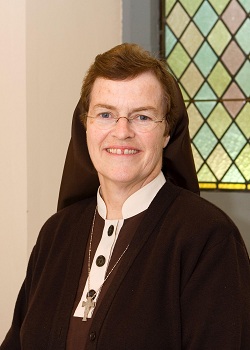
Part 1 of 3…Sr. Briege McKenna O.S.C. is a tremendous blessing for all of us in the Church! “The Power of the Sacraments” is a beautiful work which helps us all to appreciate the gift of grace that flows through the sacraments. There is such a hunger in the hearts of God’s children today for healing and peace. Sr. Briege, in her maternal nurturing way, helps us to see that the answer is right in front of us reaching out to us right now…he is Jesus Christ. “Miracles Do Happen” is her wonderful book recounting her miraculous healing and her call to mission to the world. It also expresses her great love and concern for the priesthood. Her insights are tremendous…her love for Christ and her bride, the Church, is a glorious witness and light for today’s world. She is truly one of the most inspiring persons I have ever encountered!
For more Sister Briege on Inside the Pages:
IP#65 Sr. Briege McKenna – The Power of the Sacraments part 2 on Inside the Pages
IP#66 Sr. Briege McKenna – The Power of the Sacraments part 3 on Inside the Pages
Click here to be taken to Sr. Briege’s website “St. Clare Sisters Retreat Ministry”
You can find both of Sr. Briege McKenna’s books here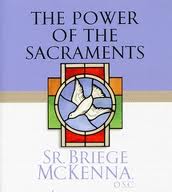
St. Clare Sisters Retreat Ministry
P.O. Box 1559
Palm Harbor, FL 34682, U.S.A.
Office: #727-786-3821
Fax: #727-787-3741
Prayerline: #727-781-5906
www.sisterbriege.com
prayer@sisterbriege.com
info@sisterbriege.com

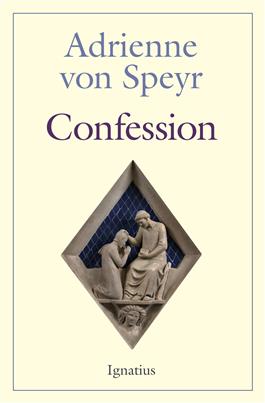


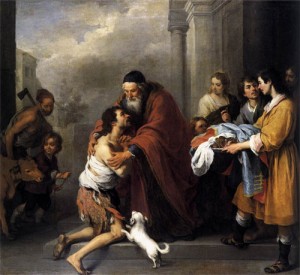

 While we should also privately repent of our sins to God, Jesus instituted the sacrament of reconciliation or penance for our own good. Statistics show that Catholic populations have historically had lower rates of suicide and depression than non-Catholics, which many psychologists attribute directly to the healthy practice of vocally confessing one’s sins.
While we should also privately repent of our sins to God, Jesus instituted the sacrament of reconciliation or penance for our own good. Statistics show that Catholic populations have historically had lower rates of suicide and depression than non-Catholics, which many psychologists attribute directly to the healthy practice of vocally confessing one’s sins.







